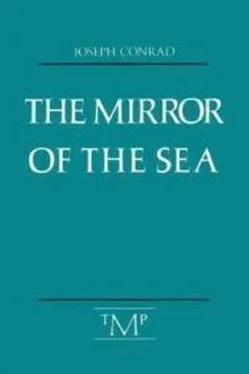Джозеф Конрад - The Mirror of the Sea
Здесь есть возможность читать онлайн «Джозеф Конрад - The Mirror of the Sea» весь текст электронной книги совершенно бесплатно (целиком полную версию без сокращений). В некоторых случаях можно слушать аудио, скачать через торрент в формате fb2 и присутствует краткое содержание. Год выпуска: 2014, Издательство: epubBooks Classics, Жанр: Биографии и Мемуары, на английском языке. Описание произведения, (предисловие) а так же отзывы посетителей доступны на портале библиотеки ЛибКат.
- Название:The Mirror of the Sea
- Автор:
- Издательство:epubBooks Classics
- Жанр:
- Год:2014
- ISBN:нет данных
- Рейтинг книги:4 / 5. Голосов: 1
-
Избранное:Добавить в избранное
- Отзывы:
-
Ваша оценка:
- 80
- 1
- 2
- 3
- 4
- 5
The Mirror of the Sea: краткое содержание, описание и аннотация
Предлагаем к чтению аннотацию, описание, краткое содержание или предисловие (зависит от того, что написал сам автор книги «The Mirror of the Sea»). Если вы не нашли необходимую информацию о книге — напишите в комментариях, мы постараемся отыскать её.
The Mirror of the Sea — читать онлайн бесплатно полную книгу (весь текст) целиком
Ниже представлен текст книги, разбитый по страницам. Система сохранения места последней прочитанной страницы, позволяет с удобством читать онлайн бесплатно книгу «The Mirror of the Sea», без необходимости каждый раз заново искать на чём Вы остановились. Поставьте закладку, и сможете в любой момент перейти на страницу, на которой закончили чтение.
Интервал:
Закладка:
The dark and fearful sea of the subtle Ulysses’ wanderings, agitated by the wrath of Olympian gods, harbouring on its isles the fury of strange monsters and the wiles of strange women; the highway of heroes and sages, of warriors, pirates, and saints; the workaday sea of Carthaginian merchants and the pleasure lake of the Roman Cæsars, claims the veneration of every seaman as the historical home of that spirit of open defiance against the great waters of the earth which is the very soul of his calling. Issuing thence to the west and south, as a youth leaves the shelter of his parental house, this spirit found the way to the Indies, discovered the coasts of a new continent, and traversed at last the immensity of the great Pacific, rich in groups of islands remote and mysterious like the constellations of the sky.
The first impulse of navigation took its visible form in that tideless basin freed from hidden shoals and treacherous currents, as if in tender regard for the infancy of the art. The steep shores of the Mediterranean favoured the beginners in one of humanity’s most daring enterprises, and the enchanting inland sea of classic adventure has led mankind gently from headland to headland, from bay to bay, from island to island, out into the promise of world–wide oceans beyond the Pillars of Hercules.
XXXIX
The charm of the Mediterranean dwells in the unforgettable flavour of my early days, and to this hour this sea, upon which the Romans alone ruled without dispute, has kept for me the fascination of youthful romance. The very first Christmas night I ever spent away from land was employed in running before a Gulf of Lions gale, which made the old ship groan in every timber as she skipped before it over the short seas until we brought her to, battered and out of breath, under the lee of Majorca, where the smooth water was torn by fierce cat’s–paws under a very stormy sky.
We—or, rather, they, for I had hardly had two glimpses of salt water in my life till then—kept her standing off and on all that day, while I listened for the first time with the curiosity of my tender years to the song of the wind in a ship’s rigging. The monotonous and vibrating note was destined to grow into the intimacy of the heart, pass into blood and bone, accompany the thoughts and acts of two full decades, remain to haunt like a reproach the peace of the quiet fireside, and enter into the very texture of respectable dreams dreamed safely under a roof of rafters and tiles. The wind was fair, but that day we ran no more.
The thing (I will not call her a ship twice in the same half–hour) leaked. She leaked fully, generously, overflowingly, all over—like a basket. I took an enthusiastic part in the excitement caused by that last infirmity of noble ships, without concerning myself much with the why or the wherefore. The surmise of my maturer years is that, bored by her interminable life, the venerable antiquity was simply yawning with ennui at every seam. But at the time I did not know; I knew generally very little, and least of all what I was doing in that galère .
I remember that, exactly as in the comedy of Molière, my uncle asked the precise question in the very words—not of my confidential valet, however, but across great distances of land, in a letter whose mocking but indulgent turn ill concealed his almost paternal anxiety. I fancy I tried to convey to him my (utterly unfounded) impression that the West Indies awaited my coming. I had to go there. It was a sort of mystic conviction—something in the nature of a call. But it was difficult to state intelligibly the grounds of this belief to that man of rigorous logic, if of infinite charity.
The truth must have been that, all unversed in the arts of the wily Greek, the deceiver of gods, the lover of strange women, the evoker of bloodthirsty shades, I yet longed for the beginning of my own obscure Odyssey, which, as was proper for a modern, should unroll its wonders and terrors beyond the Pillars of Hercules. The disdainful ocean did not open wide to swallow up my audacity, though the ship, the ridiculous and ancient galère of my folly, the old, weary, disenchanted sugar–waggon, seemed extremely disposed to open out and swallow up as much salt water as she could hold. This, if less grandiose, would have been as final a catastrophe.
But no catastrophe occurred. I lived to watch on a strange shore a black and youthful Nausicaa, with a joyous train of attendant maidens, carrying baskets of linen to a clear stream overhung by the heads of slender palm–trees. The vivid colours of their draped raiment and the gold of their earrings invested with a barbaric and regal magnificence their figures, stepping out freely in a shower of broken sunshine. The whiteness of their teeth was still more dazzling than the splendour of jewels at their ears. The shaded side of the ravine gleamed with their smiles. They were as unabashed as so many princesses, but, alas! not one of them was the daughter of a jet–black sovereign. Such was my abominable luck in being born by the mere hair’s breadth of twenty–five centuries too late into a world where kings have been growing scarce with scandalous rapidity, while the few who remain have adopted the uninteresting manners and customs of simple millionaires. Obviously it was a vain hope in 187– to see the ladies of a royal household walk in chequered sunshine, with baskets of linen on their heads, to the banks of a clear stream overhung by the starry fronds of palm–trees. It was a vain hope. If I did not ask myself whether, limited by such discouraging impossibilities, life were still worth living, it was only because I had then before me several other pressing questions, some of which have remained unanswered to this day. The resonant, laughing voices of these gorgeous maidens scared away the multitude of humming–birds, whose delicate wings wreathed with the mist of their vibration the tops of flowering bushes.
No, they were not princesses. Their unrestrained laughter filling the hot, fern–clad ravine had a soulless limpidity, as of wild, inhuman dwellers in tropical woodlands. Following the example of certain prudent travellers, I withdrew unseen—and returned, not much wiser, to the Mediterranean, the sea of classic adventures.
XL
IT was written that there, in the nursery of our navigating ancestors, I should learn to walk in the ways of my craft and grow in the love of the sea, blind as young love often is, but absorbing and disinterested as all true love must be. I demanded nothing from it—not even adventure. In this I showed, perhaps, more intuitive wisdom than high self–denial. No adventure ever came to one for the asking. He who starts on a deliberate quest of adventure goes forth but to gather dead–sea fruit, unless, indeed, he be beloved of the gods and great amongst heroes, like that most excellent cavalier Don Quixote de la Mancha. By us ordinary mortals of a mediocre animus that is only too anxious to pass by wicked giants for so many honest windmills, adventures are entertained like visiting angels. They come upon our complacency unawares. As unbidden guests are apt to do, they often come at inconvenient times. And we are glad to let them go unrecognised, without any acknowledgment of so high a favour. After many years, on looking back from the middle turn of life’s way at the events of the past, which, like a friendly crowd, seem to gaze sadly after us hastening towards the Cimmerian shore, we may see here and there, in the gray throng, some figure glowing with a faint radiance, as though it had caught all the light of our already crepuscular sky. And by this glow we may recognise the faces of our true adventures, of the once unbidden guests entertained unawares in our young days.
If the Mediterranean, the venerable (and sometimes atrociously ill–tempered) nurse of all navigators, was to rock my youth, the providing of the cradle necessary for that operation was entrusted by Fate to the most casual assemblage of irresponsible young men (all, however, older than myself) that, as if drunk with Provençal sunshine, frittered life away in joyous levity on the model of Balzac’s “Histoire des Treize” qualified by a dash of romance de cape et d’épée .
Читать дальшеИнтервал:
Закладка:
Похожие книги на «The Mirror of the Sea»
Представляем Вашему вниманию похожие книги на «The Mirror of the Sea» списком для выбора. Мы отобрали схожую по названию и смыслу литературу в надежде предоставить читателям больше вариантов отыскать новые, интересные, ещё непрочитанные произведения.
Обсуждение, отзывы о книге «The Mirror of the Sea» и просто собственные мнения читателей. Оставьте ваши комментарии, напишите, что Вы думаете о произведении, его смысле или главных героях. Укажите что конкретно понравилось, а что нет, и почему Вы так считаете.












